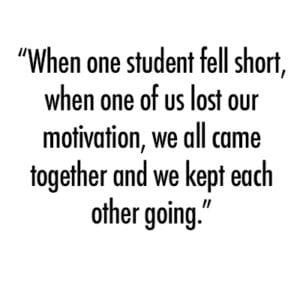For young people on their way to college for the first time, the experience can be dizzying. Traditionally, parents or family members who have already been to college are able to help college-bound students with everything from filling out financial aid forms to registering for classes on time. However, for a first-generation student whose parents didn’t go to college, that lack of support can be a major obstacle to postsecondary success.
Navigating the complex administrative requirements of a college campus can be confusing, but for first-generation students the challenges are even more profound. They often carry heavier financial burdens than their peers, are less prepared for the rigors of college work, and have a much higher chance of dropping out of school. It’s also not unusual for them to feel alone and out of their element, which is why so many find support in peer groups, students like them who face the same hurdles.  Peer supports for first-generation students often include study groups, homework clubs, and guidance from peer mentors, which allows students to feel connected to a community. These types of support are effective. Peer mentors not only increase college retention rates for first-generation students, they are proven to help provide critical social and emotional support.
Peer supports for first-generation students often include study groups, homework clubs, and guidance from peer mentors, which allows students to feel connected to a community. These types of support are effective. Peer mentors not only increase college retention rates for first-generation students, they are proven to help provide critical social and emotional support.
For Jasmine Knight, a first-generation student from Washington, D.C., her peer network at college was essential for not only for her academic success, but it also was a source of emotional support and motivation. “We were able to come together, we were going to make our mentors proud, we’re going to accomplish our goals together. When one student fell short, when one of us lost our motivation, we all came together and we kept each other going.”
Meeting a Need
First-generation students now comprise roughly a third of all college students, and are much more likely to leave school without earning a degree, so it makes sense for colleges to dedicate more resources to supporting them and making sure they thrive. Colleges and community colleges are increasingly developing programs to help first-generation students. Initiatives like I’mFirst, founded in 2013, provide in-depth online resources for first-generation students all over the country, and features multimedia content created by and for first-generation students themselves. Summer bridge programs, are another popular resource for helping first-generation college students make a smooth transition from high school to postsecondary institutions. Incoming college students, particularly first-generation students, often struggle with the pace and rigor of college studies, and these programs help ease the adjustment from a high school environment to hectic college schedules and study hours.
Keeping first-generation students on track to succeed isn’t just limited to four-year institutions, community colleges are also responding to their needs. Tidewater Community College in Virginia, for example, provides summer bridge programs to first-generation students at both of their campuses, and offers a developed range of resources for them, including one specifically designed for youth formerly in the foster care system and peer tutoring programs.
Getting Together
Lacking formal supports, sometimes first-generation students are able to turn existing informal peer support networks into official programs at their schools. As an undergraduate at Williams College, alumni Raemond Parrott and other first-generation students that had met through a summer study program formed a close bond and approached the school about developing a more formal support structure for first-generation students. “There was quite a bit of awareness amongst first-generation students that there were a lot of challenges that we faced in this environment,” said Parrott. “We would meet maybe once a month to talk about issues that we were dealing with, get advice from older students and give it to younger students.”
According to Parrott, Williams College has also recently created a network of first-generation alumni to act as mentors for undergraduate students, partly out of concern for first-generation graduation rates.
Peer support networks fill a need for guidance and support that sometimes just isn’t there for first-generation students, as the most effective supports are often the people that they share a common experience with. “There were times that I was completely and utterly lost, and I couldn’t call and ask them ‘What can I do?’” said Knight. “My family gave me as much support as they could, but it was a different type of support that I needed in college.”
George Knowles is the Digital Communications Associate at the American Youth Policy Forum.



